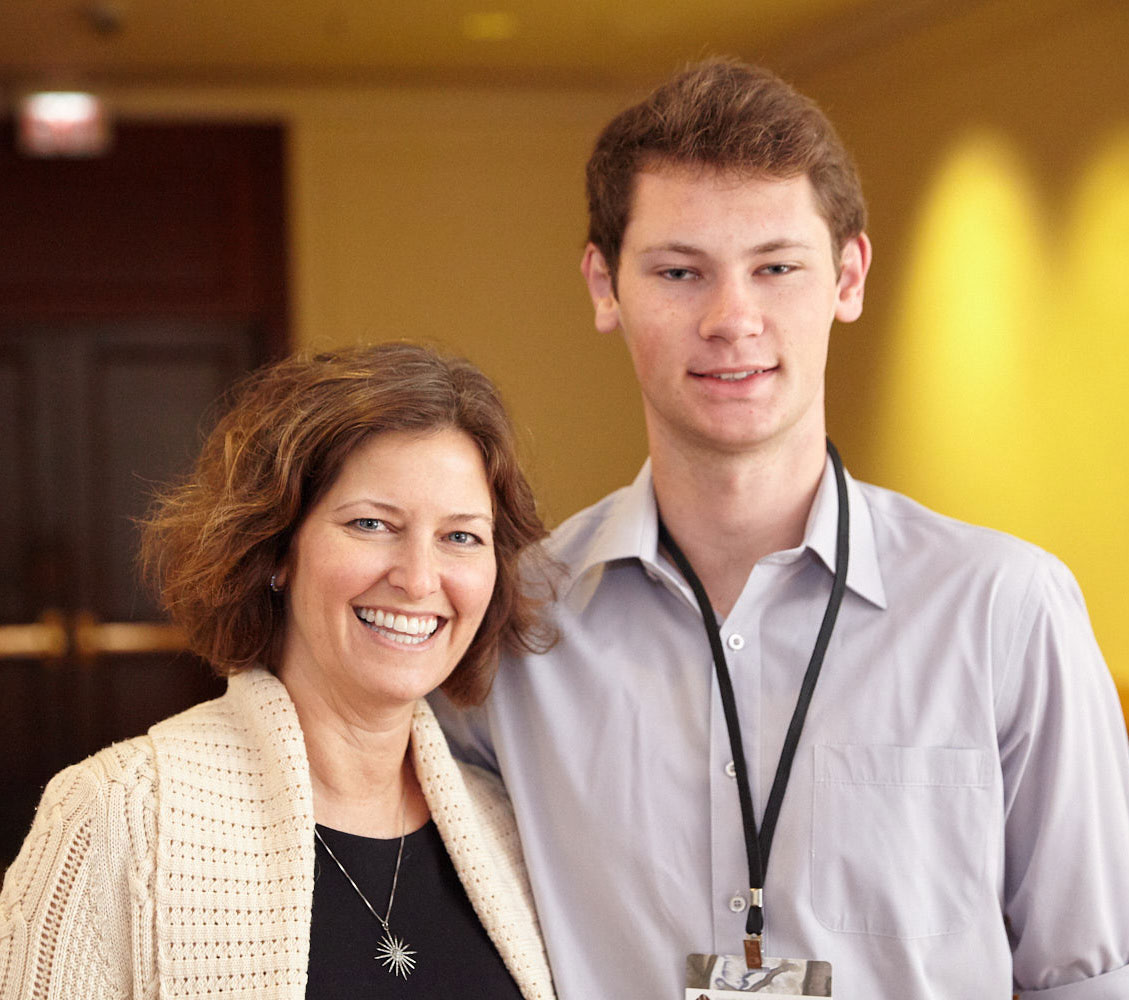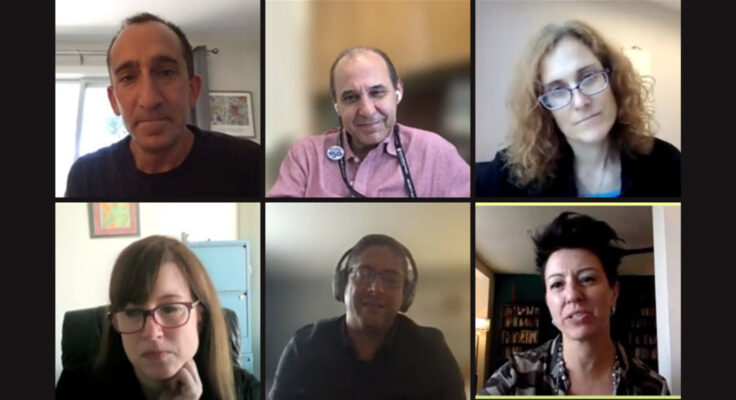The Kenneth Rainin Foundation’s annual Innovations Symposium spotlights pioneering research and innovative treatments for Inflammatory Bowel Disease (IBD). The event is a cornerstone in our collaborative approach to solving IBD. In July, our 2021 Symposium convened online, allowing more people than ever to participate and hear from experts working across disciplines.
“We were thrilled to welcome so many new attendees this year to share cutting-edge ideas and promising treatment advances.”
Laura Wilson, PhD, Rainin Foundation, Director, Health Strategy & Ventures
We welcomed 440 people from around the world. Academic and industry researchers joined clinicians, nonprofit and government funders, and editors of science and health journals. Over three half-days, keynote speakers and panel discussions centered on key themes in IBD research. Presenters offered new insights into Big Data and Therapeutic Approaches, Intestinal Immunology, and the Microbiome and Epithelial Issues. The Rainin Foundation’s Scientific Advisory Board elevated these themes as they guided discussion and robust panel participation.
“When the pandemic hit, it was important for us to be here for the community and to help keep your momentum going as best we could. This is us living our values.”
Jen Rainin, PhD, Rainin Foundation CEO
Drawing On Big Data And Broad Thinking
The Symposium highlighted important advances in research tools and our understanding of IBD. One striking—and intentional—feature was the leadership of researchers who identify as women in both academia and industry. We paired two of these investigators in a panel discussion to explore their systems orientation and the power of big data:
- Aviv Regev, PhD, transitioned from academia to lead Roche’s Genentech Research and Early Development. As a computational and systems biologist, she envisions each cell as a roadmap to understanding and treating diseases like IBD. She described how data gleaned through rigorous statistical methods and bioinformatics can reduce uncertainty and translate into new treatments.
- Katie Pollard, PhD, is director of the Gladstone Institute of Data Science and Biotechnology in San Francisco. She and her team analyze massive sets of genomic and epigenomic data to compare and decode how genomes work. Drawing on ecology and evolutionary biology, they are characterizing the genomic diversity of the human microbiome. Their approach offers unique perspectives of the microbiome in precision medicine that can translate into more effective treatments for IBD.
“With the advent of big data and new bioinformatics tools, it’s no longer a technological problem. It’s the challenge of planning for a longitudinal understanding of data through experimental design.”
Aviv Regev, PhD, Executive Vice President, Genentech Research and Early Development
Other presenters offered a similarly broad lens for understanding, treating and preventing IBD:
- Eran Elinav, MD, PhD, at the Weizmann Institute of Science is studying the mechanisms underlying host-microbiome interactions. His lab is deciphering what happens when these interactions are perturbed, and how this contributes to various multifactorial diseases.
- Janelle Ayres, PhD, at the Salk Institute explored the central question of her work: How can we drive the evolution of a pathogen into a commensal? She and her team investigate host defense strategies and the evolution of commensalism as an alternative to antagonistic relationships. Cooperative strategies use adaptation mechanisms that tolerate the pathogen while defending against damage to the host.
Strategic Priorities Ring True For Researchers
The final presentation by Rainin Foundation Synergy Awardee Aida Habtezion, PhD, was notable for both her research and her transition from academia to industry. Currently on leave from Stanford University’s School of Medicine, Dr. Habtezion found alignment with her values at Pfizer Inc. The company’s global reach and emphasis on health equity and changing people’s lives resonates with her priorities and international background.
“I’ve always been interested in the translational journey of ‘bench to bedside, bedside to bench.’ I felt I could have an even bigger clinical impact by leveraging Pfizer’s global reach and the alignment of our values and patient focus.”
Aida Habtezion, MD, Senior Vice President & Chief Medical Officer/Head, Worldwide Medical & Safety, Pfizer
In panel discussions that followed presentations, diverse perspectives found shared priorities in early intervention, genetic screening and diet. Food is especially significant for patients with IBD. As they learn new dietary strategies, they develop their own expertise and gain a measure of control over their treatment.
Diet and patient impact are also strategic priorities for the Rainin Foundation’s Health program. We encourage potential applicants to consider how their research connects with diet and can translate to patient treatments.
“Food is the biggest chemical input we take into our bodies. If we don’t address diet, as complex and daunting as it is, we are missing a big piece of the IBD puzzle.”
Michael Fishbach, PhD, Science Advisory Board Member, Rainin Foundation
Showing Up For Early Career Researchers
Our annual Innovations Symposium has historically been a live event, valued by scientists, clinicians and others for nearly ten years. Convening face-to-face among a relatively small crowd of 150 or so has been a hallmark of our gatherings. But more than 60% of the attendees at this year’s virtual event were students, post-docs and early career researchers. Representatives from smaller organizations serving the IBD community were also able to tune in. The vast majority of these participants may be unable to attend in-person events on their own. We hope this will inspire new applicants to our funding programs.
Personal Stories Reinforce Patient Focus

Rainin Foundation CEO Jen Rainin and her eldest son, Dashiell Patterson, welcomed attendees on the first day of the Symposium. They shared their personal experiences with IBD, setting a rare and important tone for the event.
Katie Pollard later grounded her work in her own family’s experience. She suffers from ulcerative colitis and one of her twin sons has Crohn’s disease. Hearing these stories is an essential reminder of the impact of chronic diseases on patients and their families. It emphasizes the importance, and oftentimes personal significance, of researchers’ work to improve the prediction, prevention and treatment of IBD.
“I feel extremely hopeful—for people like myself, my mother, my grandfather and my uncle—because of the work that all of you do.”
Dashiell Patterson, Board Member, Rainin Foundation
Generating New Insights to Advance the Field
Presenters shared their latest research findings, generating new questions and insights to advance the field.
- Aida Habtezion, MD, PhD, Pfizer, Translational IBD research and journey
- Aviv Regev, PhD, Genentech, Cell atlases as roadmaps to inflammatory disease
- Eran Elinav, MD, PhD, Weizmann Institute of Science, Host Microbiome interactions in health and disease
- Hans Clevers, MD, PhD, Hubrecht Institute, Organoids to model human diseases
- Hilde Cheroutre, PhD, La Jolla Institute for Immunology, Oral Non-Pathogen-Derived Antigens induce “Protective Tolerance” at the intestinal border
- Holm Uhlig, MD, University of Oxford, Monogenic Inflammatory Bowel Diseases – macrophage metabolism and antimicrobial activity
- Janelle Ayres, PhD, Salk Institute, Host defense strategies and the evolution of commensalism
- Katie Pollard, PhD, University of California San Francisco, Microbiome strain tracking in inflammatory bowel disease
- Lora Hooper, PhD, University of Texas Southwestern, Bacterial regulation of vitamin A transport in the intestine
- Ruslan Medzhitov, PhD, Yale School of Medicine, Role of immune system in dietary adaptation
- Thad Stappenbeck, MD, PhD, Cleveland Clinic, Fact or Myth: Infection in Inflammatory Bowel Disease
- Wendy Garrett, MD, PhD, Harvard T.H. Chan School of Public Health, Inflammatory bowel diseases and the gut microbiota: risk alleles, taxa, and metabolites
“As a current medical school student who was diagnosed with UC in 2015, this was really motivating and interesting. I really enjoyed this and am excited to see where the future of medicine goes in treating individuals with IBD.”
Jonathan Derouen, University of Oklahoma Health Sciences Center
Fostering Collaboration To Cure IBD
The Foundation launched the Innovations Symposium with a simple idea—to bring researchers from various fields together to share their work and its implications for IBD. It also allows us to listen, which is essential to improving our grantmaking programs. We are gratified that attendees felt a sense of community and connection at the event. But we recognize the limitations and challenges of collaborating virtually. We are eager to hear your ideas about how to create more effective opportunities to connect in these compromised conditions. You can contact our Health program staff here. We hope that each event sparks innovative ideas that lead to breakthroughs and our ultimate goal: a cure for IBD.
“I dislike (despise?) virtual scientific symposia. This one, however, was the best one I have attended in the last 16 months. I also encouraged all my trainees and staff to attend and they really enjoyed the talks and discussion.”
David Boone, PhD, Indiana University School of Medicine

